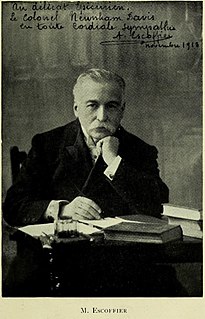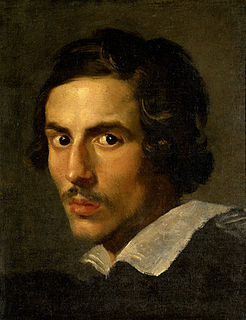A Quote by Auguste Escoffier
The painter, sculptor, writer, and musician are protected by law. So are inventors. But the chef has absolutely no redress for plagiarism on his work; on the contrary, the more the latter is liked and appreciated, the more will people clamour for his recipes.
Related Quotes
There should be a law that no ordinary newspaper should be allowed to write about art. The harm they do by their foolish and random writing it would be impossible to overestimate--not to the artist but to the public.... Without them we would judge a man simply by his work; but at present the newspapers are trying hard to induce the public to judge a sculptor, for instance, never by his statues but by the way he treats his wife; a painter by the amount of his income and a poet by the colour of his necktie.
What do you think an artist is? An imbecile who has only his eyes if he's a painter, or ears if he's a musician, or a lyre at every level of his heart if he's a poet, or even, if he's a boxer, just his muscles? On the contrary, he's at the same time a political being, constantly alive to heart-rending, burning, or happy events in the world.
When a sculptor creates a sculpture, a writer writes a novel, or a painter paints a motif on a canvas, he needs talent and expertise. But to be successful in his endeavor, he also needs to have the passionate feeling that he wants, at all costs, to create a work of art which, in his head, constantly demands to be accomplished. The same also applies to developing board games or card games.
Man offers himself to God. He stands before Him like the canvas before the painter or the marble before the sculptor. At the same time he asks for His grace, expresses his needs and those of his brothers in suffering. Such a type of prayer demands complete renovation. The modest, the ignorant, and the poor are more capable of this self-denial than the rich and the intellectual.
I believe that there never was a creator of a philosophical system who did not confess at the end of his life that he had wasted his time. It must be admitted that the inventors of the mechanical arts have been much more useful to men that the inventors of syllogisms. He who imagined a ship towers considerably above him who imagined innate ideas.
A willing, cheerful worker, with his heart in his job, will turn out more work and more satisfactory work in 44 hours than an unwilling worker, dissatisfied with his conditions, will turn out in 54 hours. It is good business, therefore, for every employer to go as far as he possibly can in reaching a schedule agreeable to his people.
The skeptic says that the believer has lost his own mind under God. On the contrary, it is the people who follow God who are most like his children, who willingly and consciously walk in his will; but those who oppose him oppose him vainly and at their own expense, and, figuratively, seem to be more like his tools. They don't diminish his glory, but instead he still manages to use them in ways of unconsciously carrying out his will.
There are two devices which can help the sculptor to judge his work: one is not to see it for a while. The other... is to look at his work through spectacles which will change its color and magnify or diminish it, so as to disguise it somehow to his eye, and make it look as though it were the work of another.








































